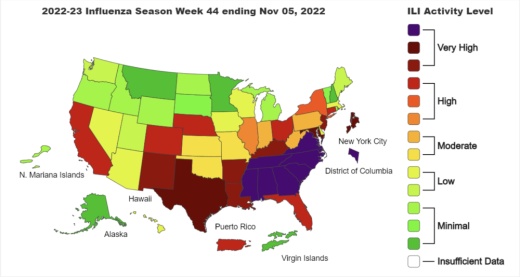The U.S. flu season typically occurs during the fall and winter with peak case levels between December and January, according to the U.S. Centers for Disease Control and Prevention.
As of Nov. 5, nearly 8% of medical patient visits in Texas were due to influenza-like illnesses, which include the flu and similar respiratory viruses. Each week, health care providers share data with the DSHS that demonstrates how many of their patients were seen for a flu-like illness.
Flu symptoms include a fever, chills, muscle aches, a cough, a sore throat, a runny or stuffy nose, and fatigue, according to the CDC.
Visits for flu-like illnesses were substantially lower during the 2020-21 and 2021-22 flu seasons, largely due to the precautions taken against COVID-19, such as masking, social distancing and working from home.
Last year, flu activity was around 2.5% in early November. Levels were below 2% during the same period in 2020, according to DSHS data.
DSHS interim Commissioner Jennifer Shuford said fewer Texans were exposed to the flu over the past couple of years, which led to decreased immunity across the state. The flu season is also “notoriously unpredictable,” Shuford said, meaning officials do not know how flu activity will look for the rest of the year and going into 2023.
For that reason, Shuford recommended people get their flu shot sooner than later. It takes about two weeks for someone’s body to produce the antibodies needed to fight the flu, according to a news release from the DSHS.
“A flu shot will keep somebody from getting [the] flu at all,” Shuford said. “And for people who do end up getting [the] flu after the flu shot, their illness is less likely to be a severe illness and less likely to result in hospitalization and death.”
According to the CDC, young children, older adults, pregnant people and people with other health conditions are more likely to experience complications due to the flu, especially if they do not receive a flu shot.
To minimize the spread of the flu, Shuford recommended Texans:
- Stay home if they are feeling sick;
- Limit time around friends or family members who are sick;
- Wash their hands frequently; and
- Cover their nose and mouth when coughing or sneezing.
Antiviral medications are also available to help make flu symptoms milder and shorten how long people are sick. Shuford said these medications are most effective shortly after someone begins experiencing symptoms.
Texans can receive their flu shot and updated COVID-19 booster shot at the same time, according to the release. The updated booster was designed to protect against the highly contagious omicron variant as well as the original strain of the SARS-CoV-2 virus.






